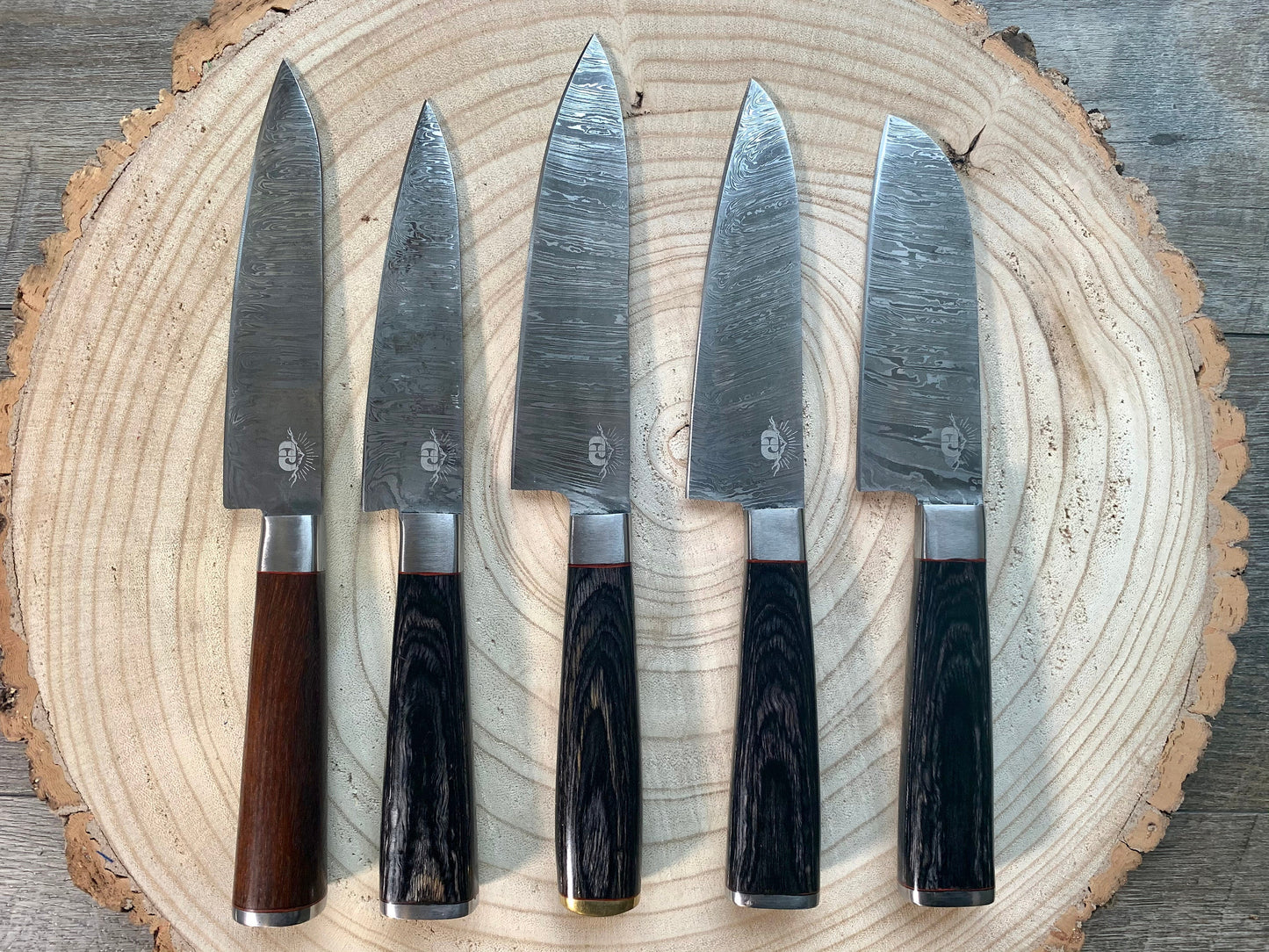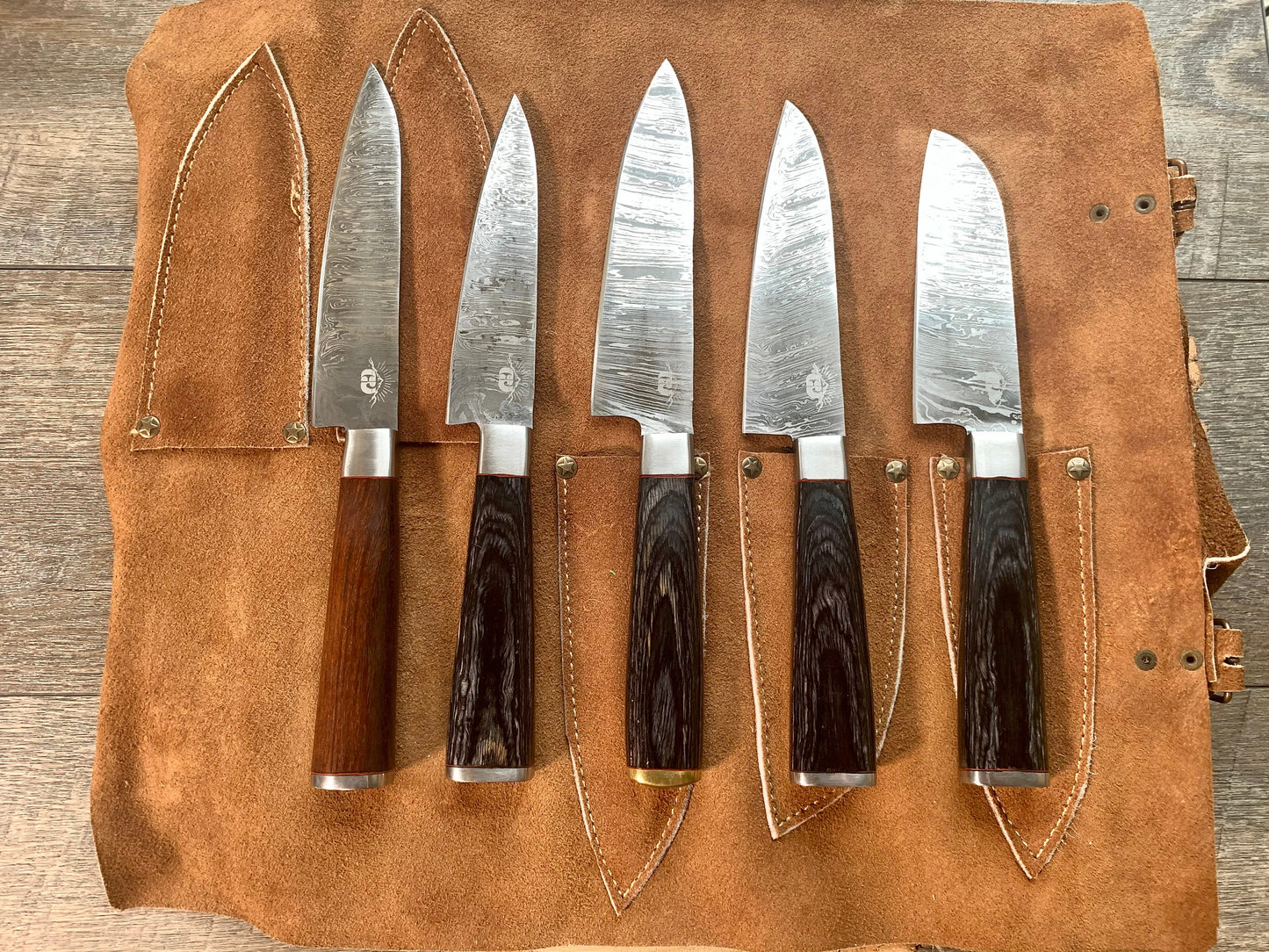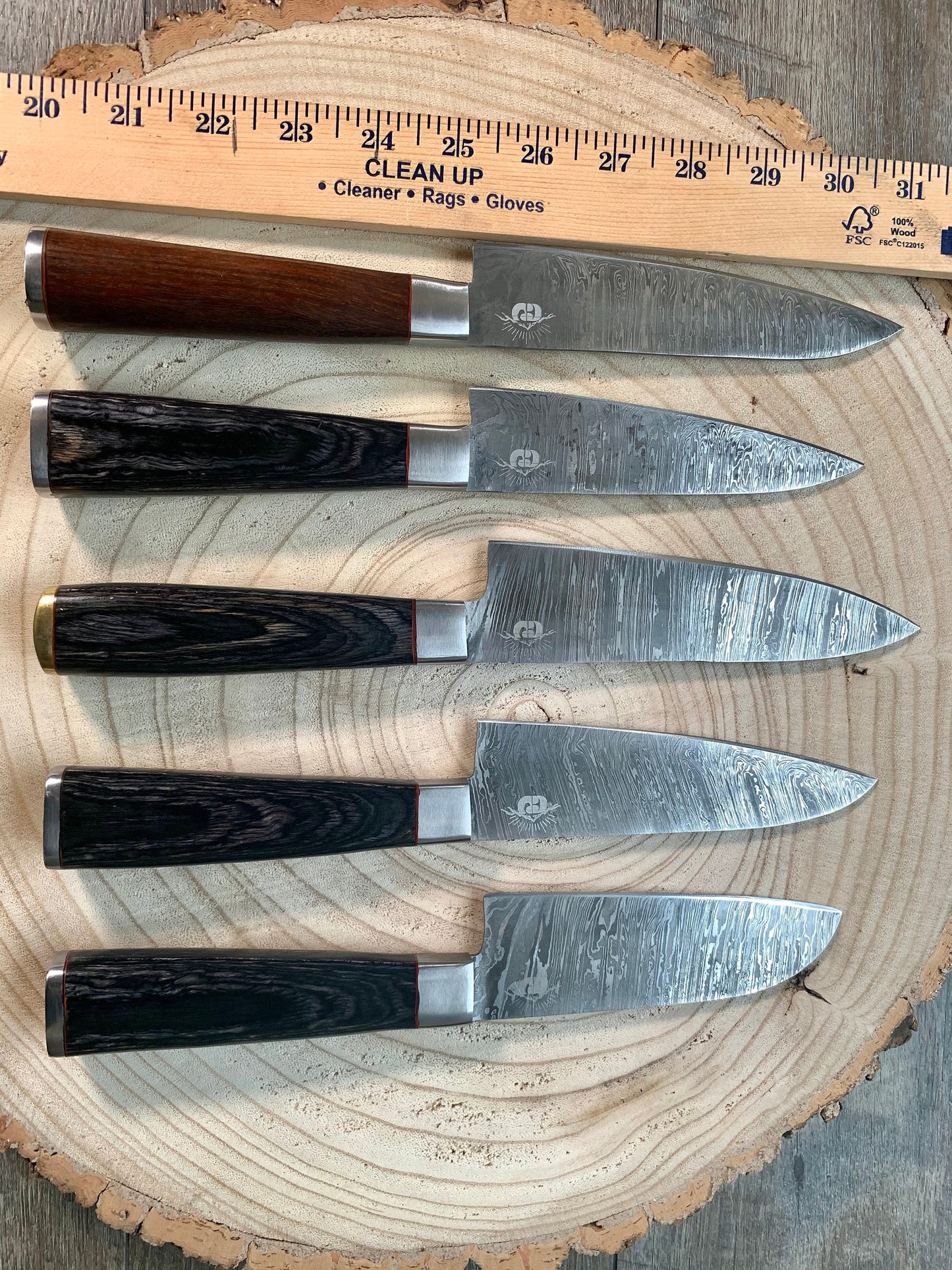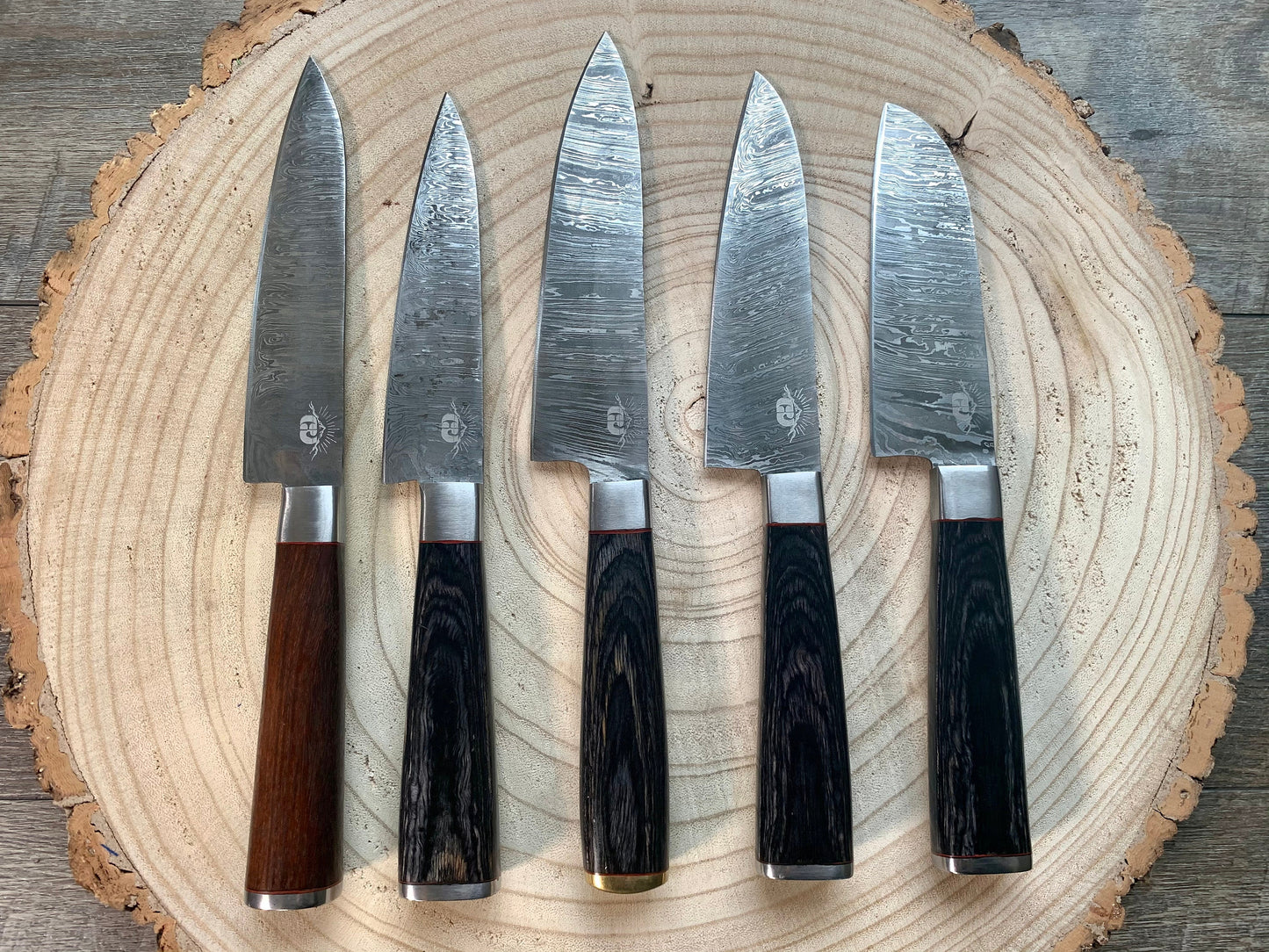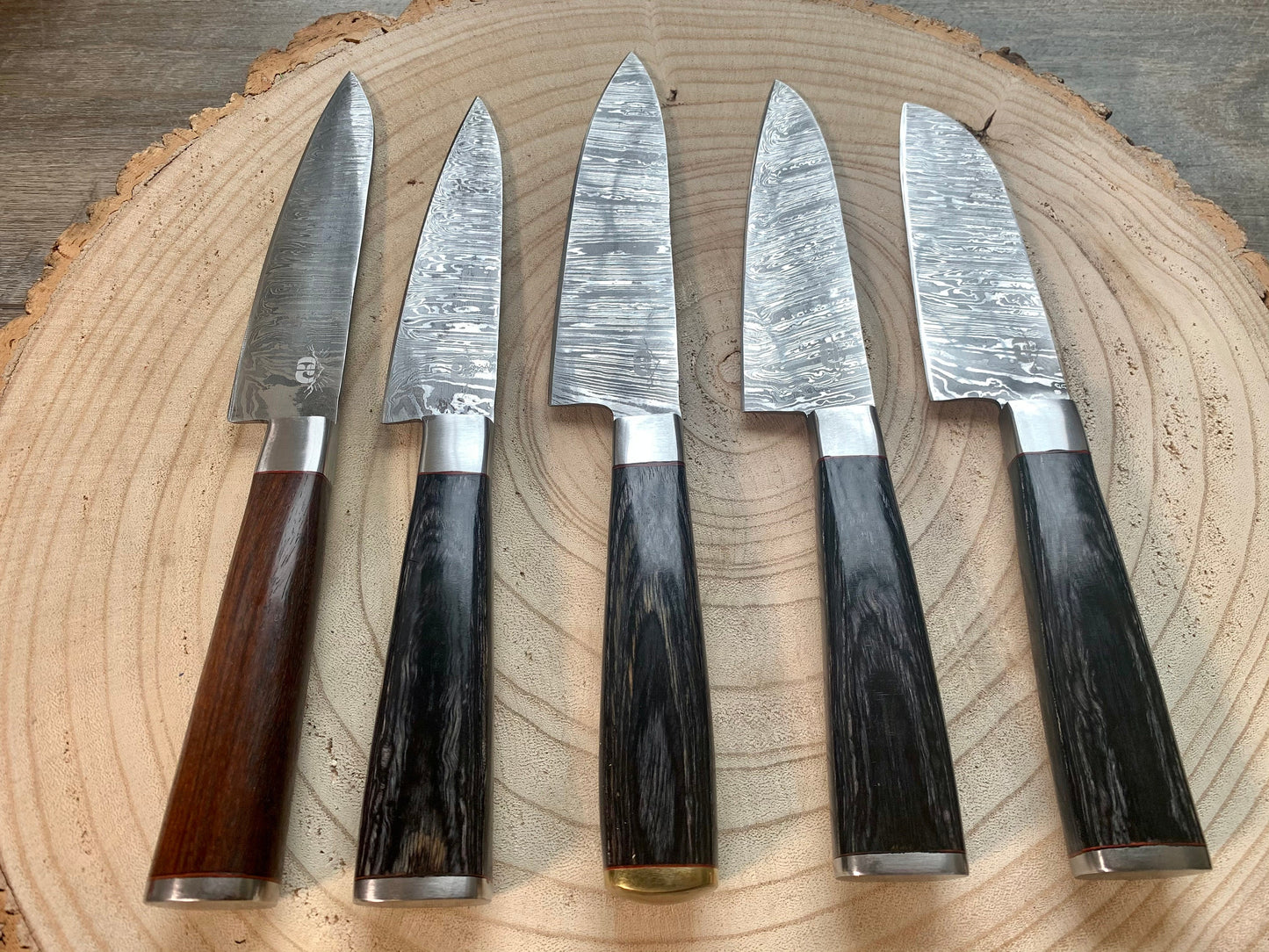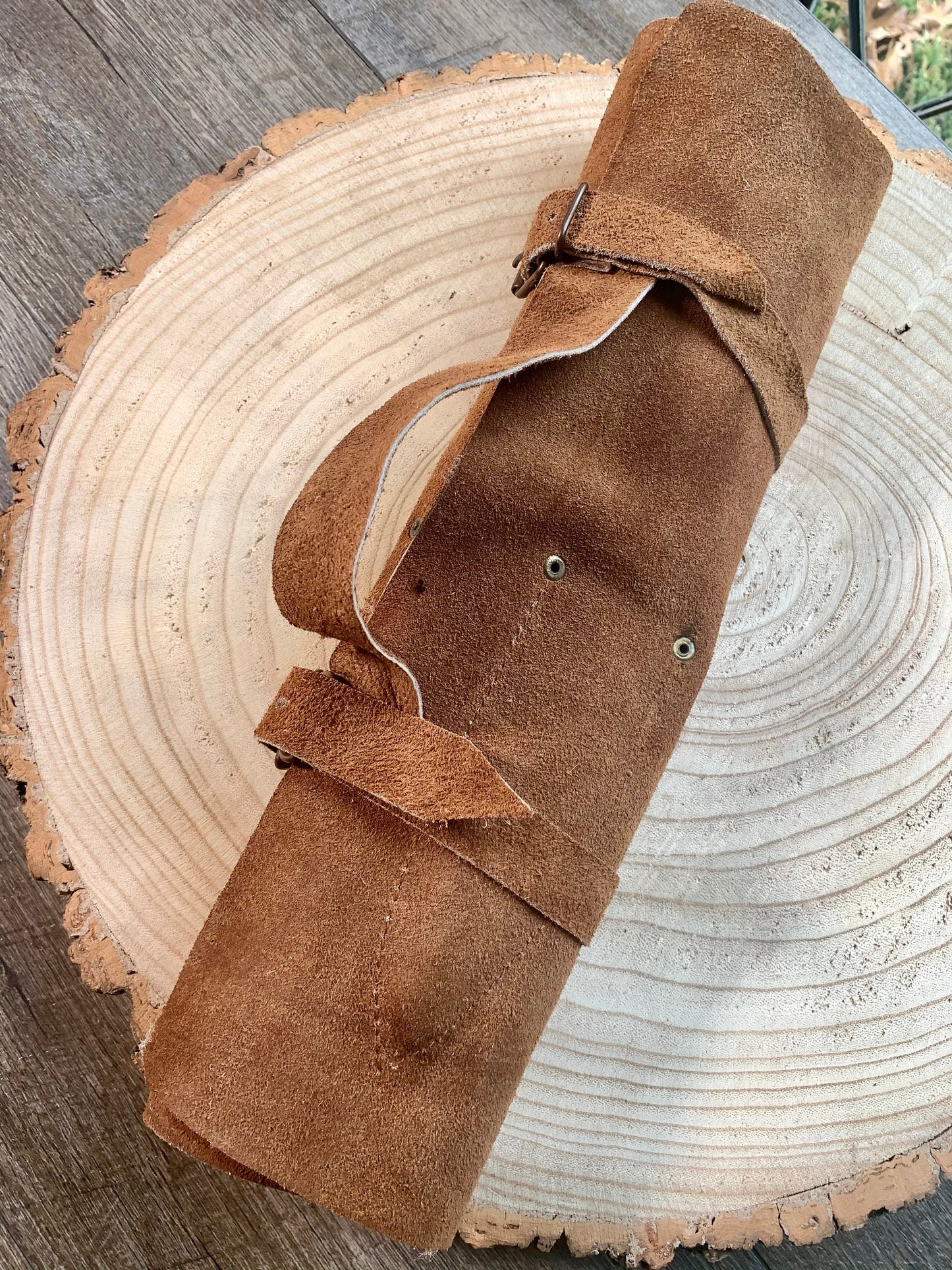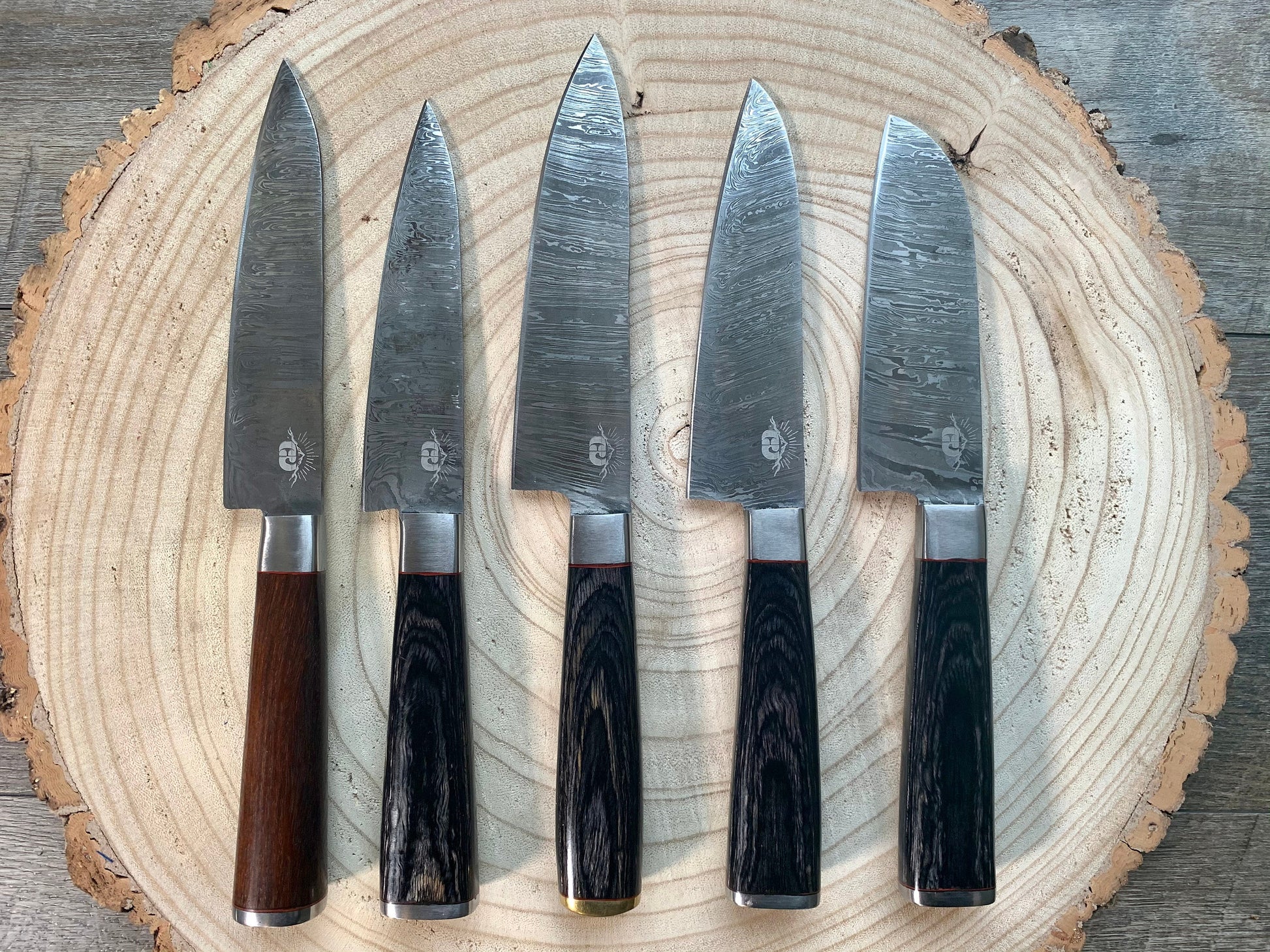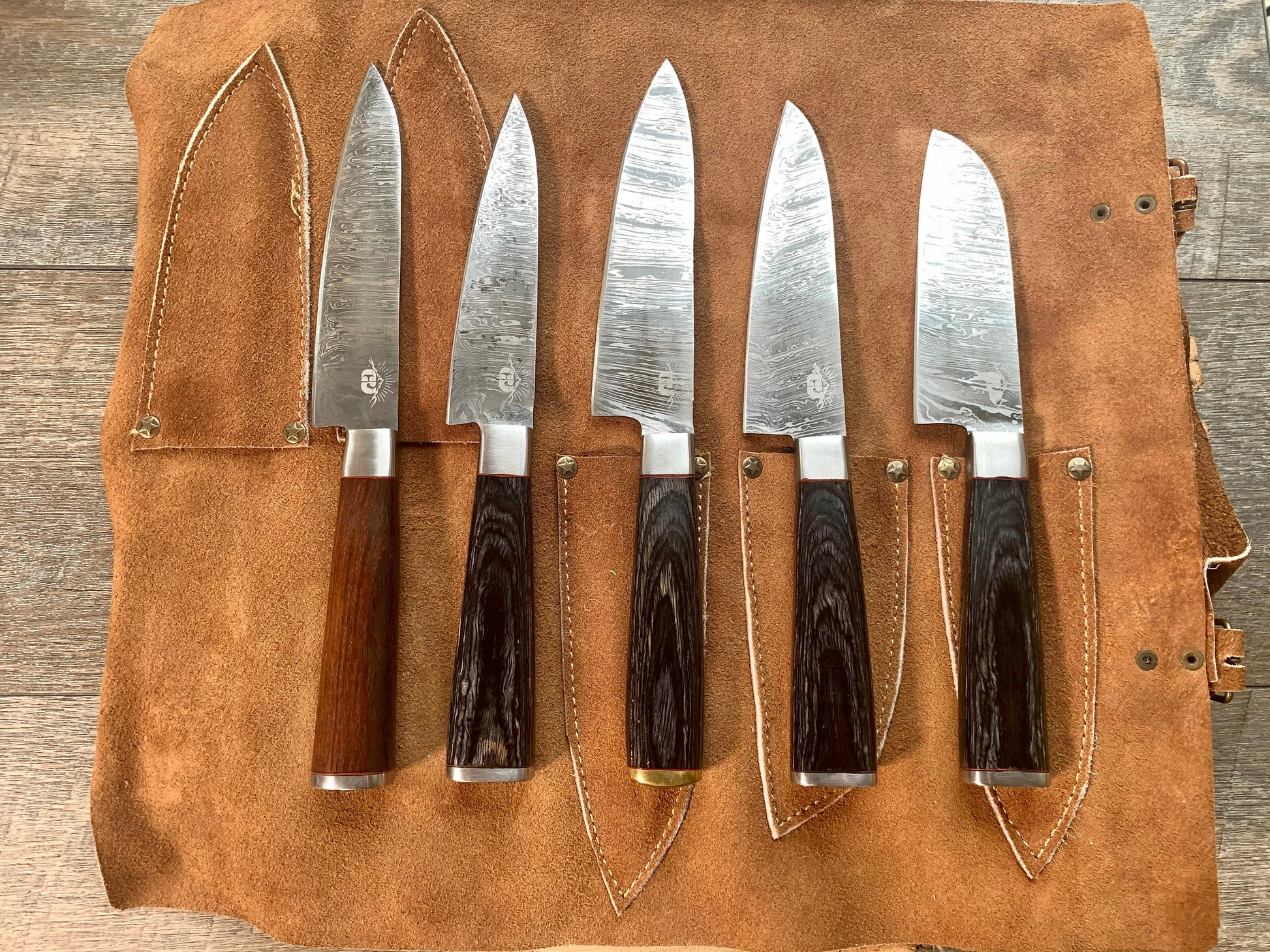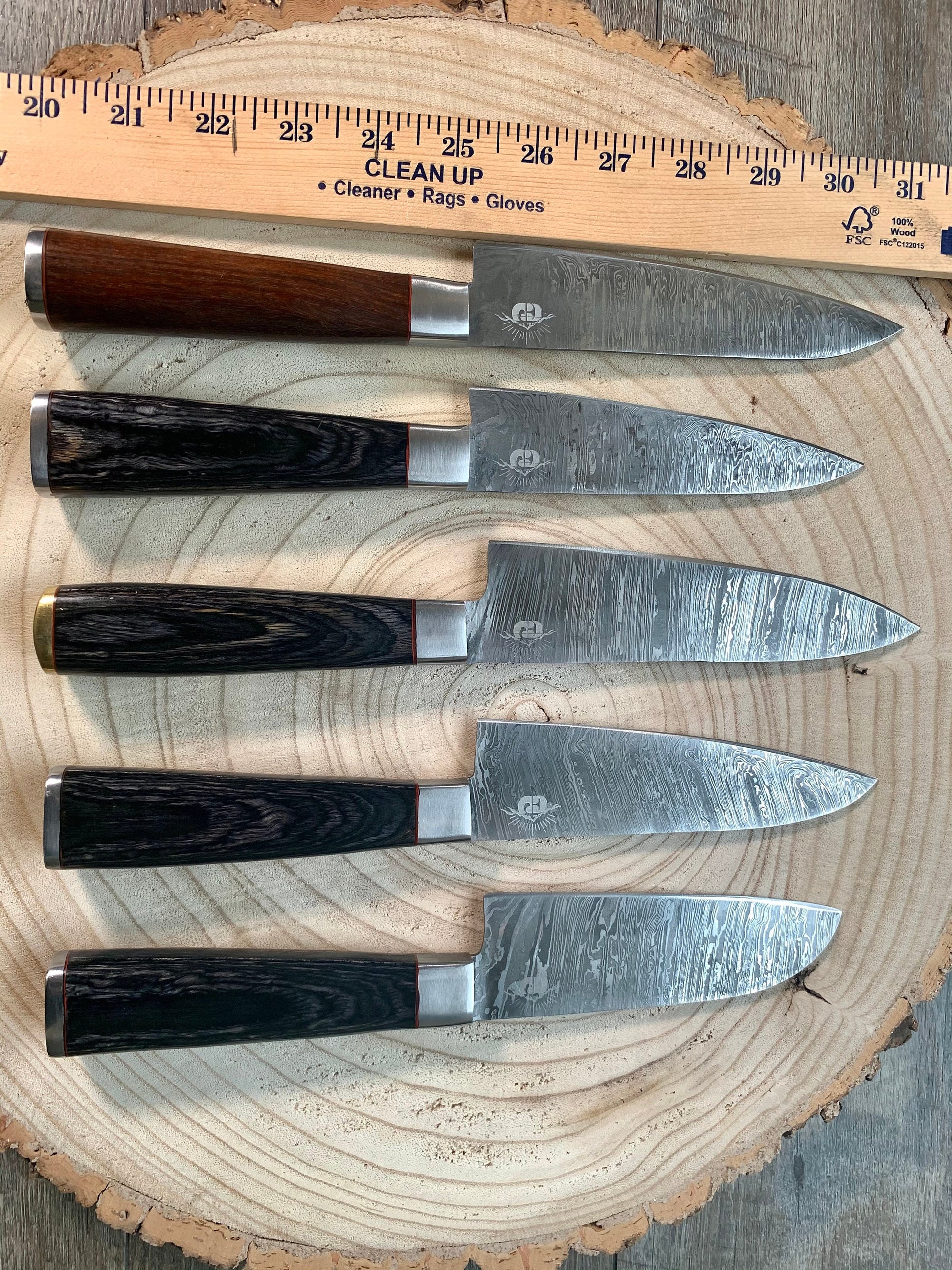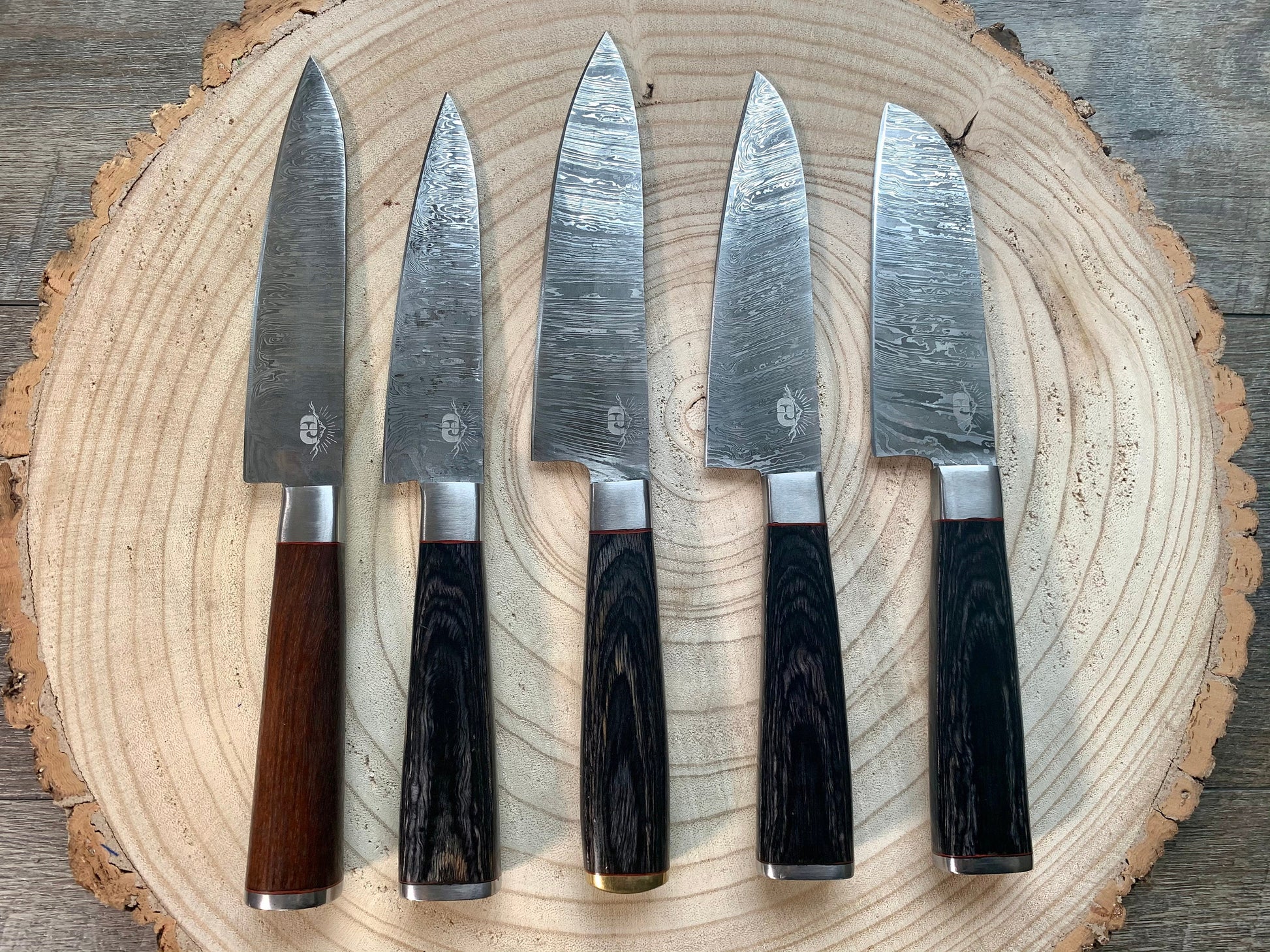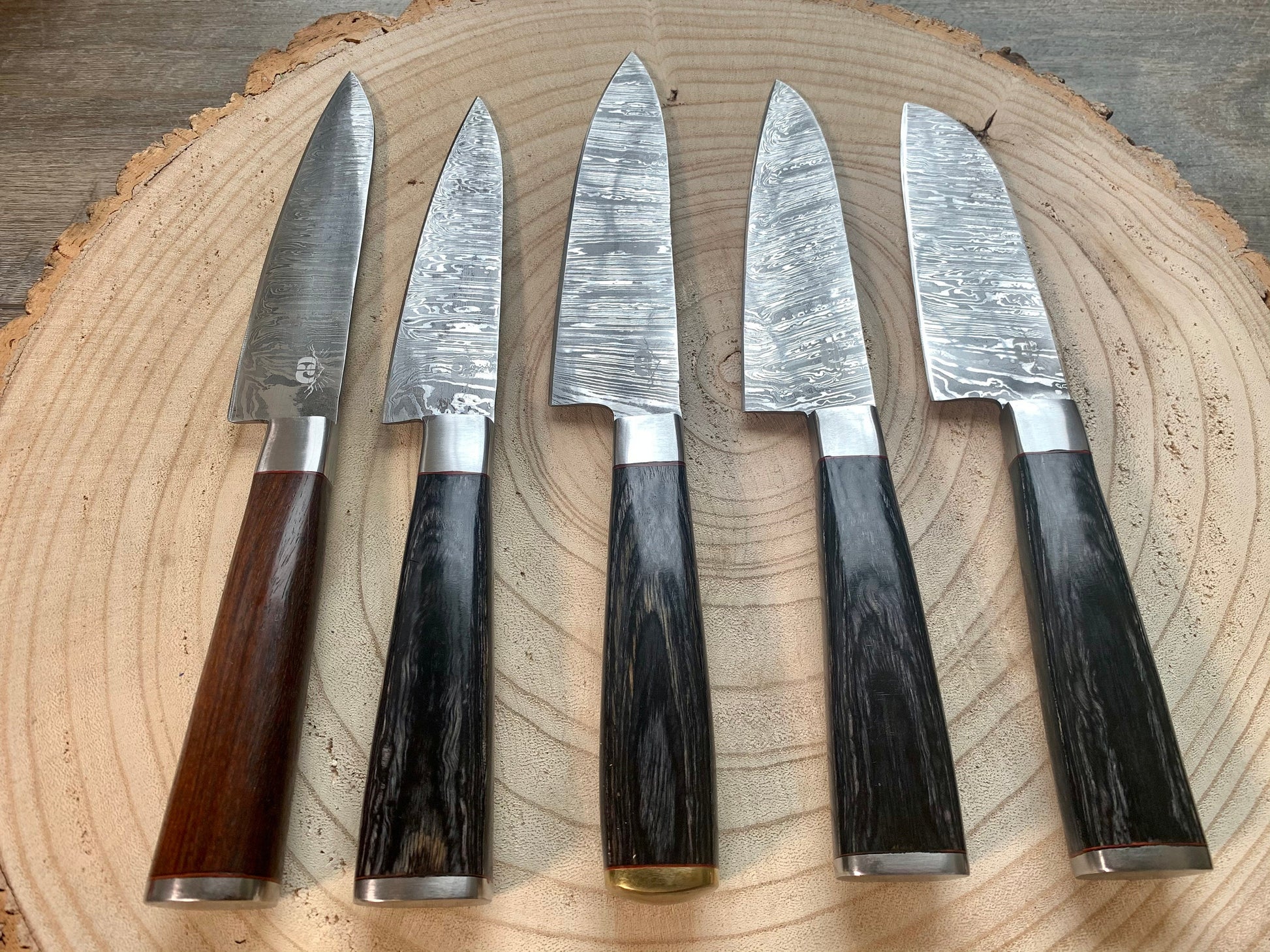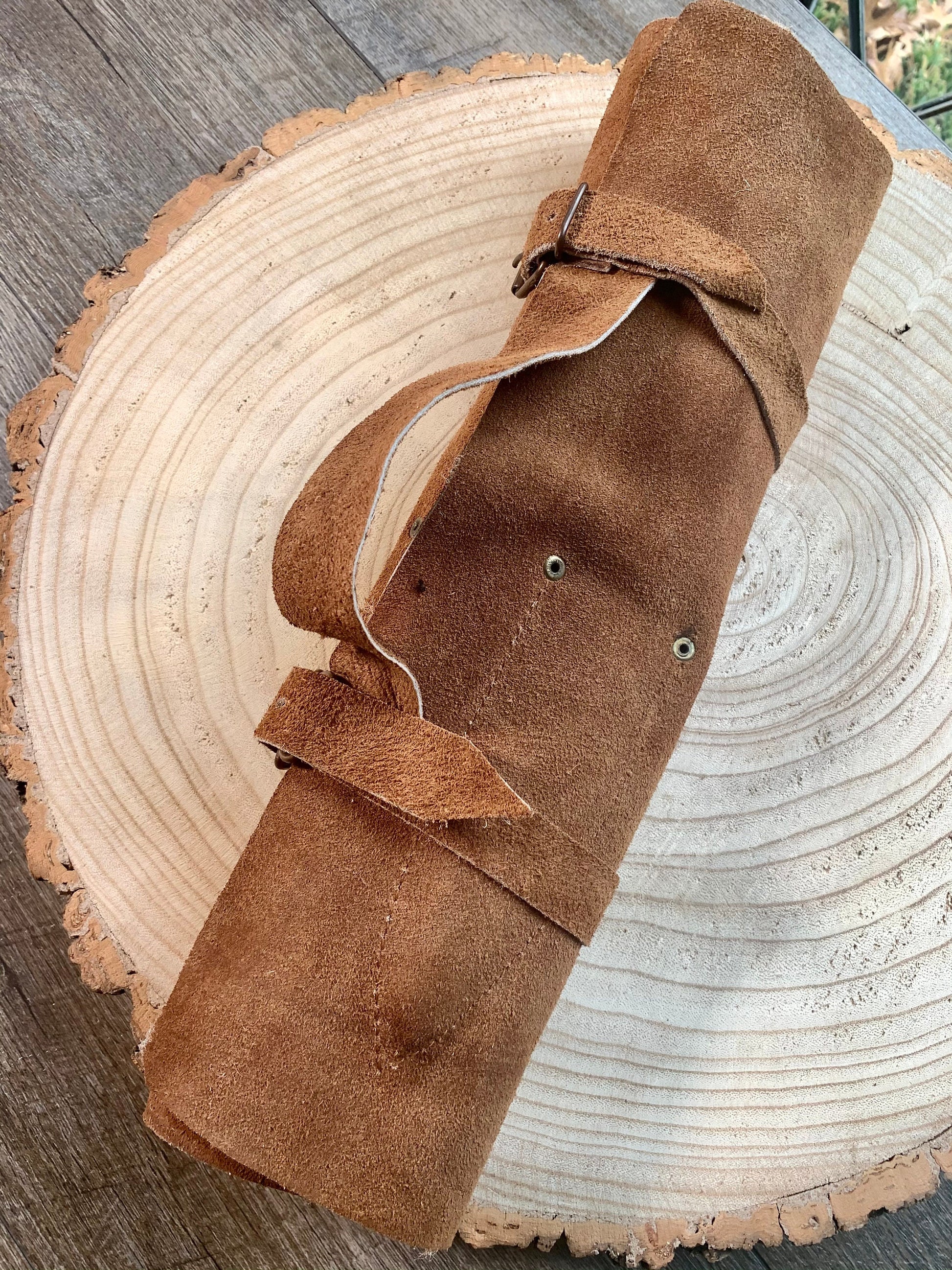1
/
of
6
Crashpad Ventures
Chef Knife Set - 5 Piece - Damascus Steel Hand Forged w/ Chef Roll Carry Case
Chef Knife Set - 5 Piece - Damascus Steel Hand Forged w/ Chef Roll Carry Case
Regular price
$275.00 USD
Regular price
$0.00 USD
Sale price
$275.00 USD
Unit price
/
per
Couldn't load pickup availability
Beautiful 5 Piece Damascus Fire Chef Set, complete with custom leather chef's roll carrying case.
Each knife is hand forged Damascus Steel in Fire Pattern, with razor sharpened cutting edges. One handle in Rosewood and others black wood pattern resin with steel bolsters bolsters.
1 - Medium Chef Knife - 5" Handle, 6" Blade, Overall 11", Rosewood Handle
1 - Medium Chef Knife - 5" Handle, 6.5" Blade, Overall 11.5"
1 - Small Utility / Paring Knife - 5" Handle, 5.5" Blade, Overall 10.5"
1 - Small Chef Knife 5" Handle, 5.5" Blade, Overall 10.5"
1 - Small Slicing knife 5" Handle, 5.5" Blade, Overall 10.5"
Delivered with care (free shipping) from the great State of Texas.
HISTORY
There is a long history of Damascus Steel being used for making knives, swords, daggers, etc. It originated in the Near East; later introduced in the thriving weapon economy of Damascus. Damascus steel craftsmanship was a lost art form for the past few centuries, but has been revived over the past few decades. The "wootz steel" used in the origin years is no longer used, but modern day metalsmiths have mastered the art form of pattern welding, where different types of steel are used to form a billet, typically a combination of 1095 and 15N20 carbon steel. The billet is then folded multiple times creating layers that form the beautiful patterns found in Damascus Steel, hardening in the process. The blades are typically hardened to 57-58 HRC; professionals and experienced home cooks look for kitchen knives with an HRC rating of 55 and above (HRC ratings higher than ~64 are too brittle for effective blade use). The result is a long lasting cutting edge on a beautiful patterned blade. This is a hand crafted process that cannot be mass produced and speaks to the craftsmanship and skill of the artisan.
KNIFE CARE:
Damascus steel has a high carbon content and is prone to rust when exposure to moisture or acidic residue is left un-tended. Immediately after use, wipe down the blade and thoroughly dry (wash with warm water if necessary, but do not use soapy / dishwater), and apply a coat of vegetable oil, coconut oil, or any lubricated oil/vaseline. Store or display in a dry space. Note that for long term storage, the custom leather sheath should not be used. Use the sheath as you carry or transport the knife, but do not leave in the sheath for extended periods of time.
SHARPENING:
Damascus steel requires no special techniques for sharpening. As with all quality knives, the best way to sharpen a Damascus blade is by using a whetstone.
Keep blades honed during use with a honing steel, and use 400/1000 grit ceramic sharpening stones after liberal use (6 months - 1 year).
Each knife is hand forged Damascus Steel in Fire Pattern, with razor sharpened cutting edges. One handle in Rosewood and others black wood pattern resin with steel bolsters bolsters.
1 - Medium Chef Knife - 5" Handle, 6" Blade, Overall 11", Rosewood Handle
1 - Medium Chef Knife - 5" Handle, 6.5" Blade, Overall 11.5"
1 - Small Utility / Paring Knife - 5" Handle, 5.5" Blade, Overall 10.5"
1 - Small Chef Knife 5" Handle, 5.5" Blade, Overall 10.5"
1 - Small Slicing knife 5" Handle, 5.5" Blade, Overall 10.5"
Delivered with care (free shipping) from the great State of Texas.
HISTORY
There is a long history of Damascus Steel being used for making knives, swords, daggers, etc. It originated in the Near East; later introduced in the thriving weapon economy of Damascus. Damascus steel craftsmanship was a lost art form for the past few centuries, but has been revived over the past few decades. The "wootz steel" used in the origin years is no longer used, but modern day metalsmiths have mastered the art form of pattern welding, where different types of steel are used to form a billet, typically a combination of 1095 and 15N20 carbon steel. The billet is then folded multiple times creating layers that form the beautiful patterns found in Damascus Steel, hardening in the process. The blades are typically hardened to 57-58 HRC; professionals and experienced home cooks look for kitchen knives with an HRC rating of 55 and above (HRC ratings higher than ~64 are too brittle for effective blade use). The result is a long lasting cutting edge on a beautiful patterned blade. This is a hand crafted process that cannot be mass produced and speaks to the craftsmanship and skill of the artisan.
KNIFE CARE:
Damascus steel has a high carbon content and is prone to rust when exposure to moisture or acidic residue is left un-tended. Immediately after use, wipe down the blade and thoroughly dry (wash with warm water if necessary, but do not use soapy / dishwater), and apply a coat of vegetable oil, coconut oil, or any lubricated oil/vaseline. Store or display in a dry space. Note that for long term storage, the custom leather sheath should not be used. Use the sheath as you carry or transport the knife, but do not leave in the sheath for extended periods of time.
SHARPENING:
Damascus steel requires no special techniques for sharpening. As with all quality knives, the best way to sharpen a Damascus blade is by using a whetstone.
Keep blades honed during use with a honing steel, and use 400/1000 grit ceramic sharpening stones after liberal use (6 months - 1 year).
Share
